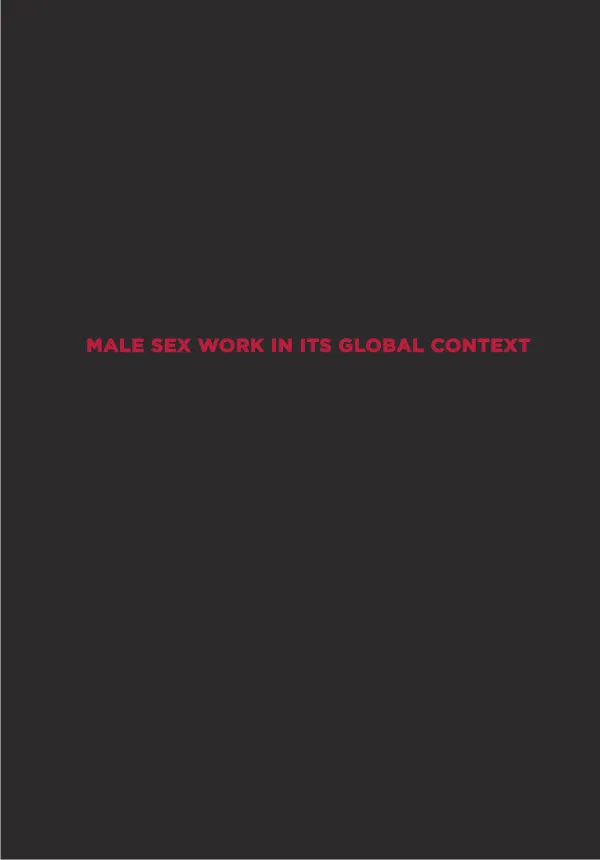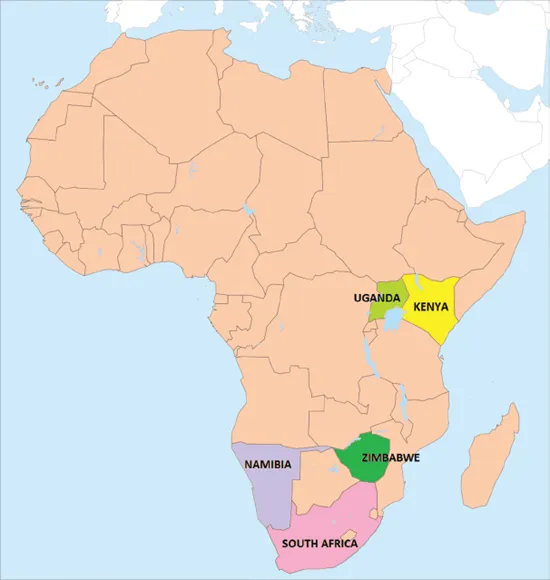
This is a test
- English
- ePUB (mobile friendly)
- Available on iOS & Android
eBook - ePub
Male Sex Work and Society
Book details
Book preview
Table of contents
Citations
About This Book
This new collection explores for the first time male sex work from a rich array of perspectives and disciplines. It aims to help enrich the ways in which we view both male sex work as a field of commerce and male sex workers themselves.
Leading contributors examine the field both historically and cross-culturally from fields including public health, sociology, psychology, social services, history, filmography, economics, mental health, criminal justice, geography, and migration studies, and more.
Synthesizing introductions by the editors help the reader understand the implications of the findings and conclusions for scholars, practitioners, students, and members of the interested/concerned public.
Frequently asked questions
At the moment all of our mobile-responsive ePub books are available to download via the app. Most of our PDFs are also available to download and we're working on making the final remaining ones downloadable now. Learn more here.
Both plans give you full access to the library and all of Perlego’s features. The only differences are the price and subscription period: With the annual plan you’ll save around 30% compared to 12 months on the monthly plan.
We are an online textbook subscription service, where you can get access to an entire online library for less than the price of a single book per month. With over 1 million books across 1000+ topics, we’ve got you covered! Learn more here.
Look out for the read-aloud symbol on your next book to see if you can listen to it. The read-aloud tool reads text aloud for you, highlighting the text as it is being read. You can pause it, speed it up and slow it down. Learn more here.
Yes, you can access Male Sex Work and Society by Victor Minichiello, John Scott in PDF and/or ePUB format, as well as other popular books in Social Sciences & LGBT Studies. We have over one million books available in our catalogue for you to explore.
Information

| 12 | Male Sex Work in Southern and Eastern Africa |
Background to the Research: Aims and Objectives
The aim of the present study was to explore the social contexts, life experiences, vulnerabilities, and sexual risks experienced by men who sell sex in Southern and Eastern Africa, with a focus on five countries: Kenya, Namibia, South Africa, Uganda, and Zimbabwe. These issues were explored in the context of a participatory workshop and focused groups conducted with male sex workers (MSWs). Held in Johannesburg in December 2011, the workshop was underpinned by a definition of MSWs as “any man who accepts money or goods [favor, reward, value] in exchange for sex with another man” (Kellerman et al., 2009). The aim was to explore personal life stories as a way to achieve an understanding of the subjective circumstances and experiences of men who sell sex in these countries. We focused in particular on the experience of men who not only sold sex to other men but who, for the most part, self-identified with same-sex sexuality.
The work also sought to develop new and more effective means of representing MSWs through a respondent-driven approach, which included a seed/snowball method that involved follow-up work in Kenya and Namibia (Magnani et al., 2005). The MSWs who took part in the research represented different contexts on the African continent and a cross-section of personal experiences. They also were among those who might support and develop ongoing leadership for male sex workers in Africa. Against this background, our exploration included three distinct but overlapping areas:
Social contexts, including the geographic and political contexts of male sex work.
Sexual practices, including sexual activities, roles, identities, and internal and external responses to the labels designating both men who have sex with men and male sex workers, as applied popularly and in HIV prevention work.
Structural and personal risk factors, including a range of themes related to personal and social responses to male sex work within the context of marginalization and human rights violations, the absence of explicitly protective laws, HIV and AIDS, substance abuse, sociopolitical influences, family, culture and taboos, religion, stigma/prejudice, internalized phobias, and legislation.

FIGURE 12.1
African countries studied by the authors of this chapter.
Exploring these issues enabled us to develop a profile of key concerns related to understanding male sex work in the region. We specifically sought to add to the qualitative analyses of the social contexts and health-seeking practices, human rights scenarios, social and personal vulnerabilities, and HIV-related risks among men who sell sex in specific settings in the five countries. We sought specific information on male sex workers’ life stories, social vulnerabilities, and sociosexual practices and risks. It is important to note that this information represents the particular viewpoints of certain individuals and thus should not be considered an analysis or assessment of the countries represented per se but, rather, a presentation of personal views that are indicative of differences and similarities across countries in the region (Magnani et al., 2005). These viewpoints were explored in context as being relevant to the development of advocacy, representation, rights, HIV prevention, and health promotion for men who sell sex in Africa.1
Context: Sexualities, Sex Work, HIV, and Social Justice
In some African countries, sexual and gender minority peoples have, over the last few years, become more visible and vocal in claiming their legal and social rights, including rights to HIV prevention, treatment, and care. This has occurred against the background of complex and resurgent homo-prejudice and hate crimes in parts of Africa, wherein same-sex sexualities have been increasingly subject to pernicious legislation and prejudice (Okal et al., 2009). Within this broader context, the basic HIV prevention needs of the majority of men in Africa who have sex with men are typically underserved, most often because of prejudice and/or denial in many countries that such men exist, including within civil society and government bodies (Baral et al., 2009; Nguyen, 2005). Moreover, the risky sexual practices, social vulnerabilities, and prevalence of HIV among men who have sex with men remain significantly underresearched and consequently are poorly addressed in HIV prevention programming (Kellerman et al., 2009). A recent study conducted in Malawi, Namibia, and Botswana, for example, found that men who have sex with men who are over the age of 25 are more likely to be HIV positive and to practice unprotected sex than younger men in the study cohort. Moreover, they are more likely to engage in concurrent sexual relationships with men and women, significantly blurring any meaningful differentiation between what might be designated as homosexual and heterosexual life worlds and HIV epidemiologies (Baral et al., 2007; Baral et al., 2009; Fipaza, 2010; Mannava et al., 2013; van Griensven, 2007).
Research on male sex work in Africa has revealed an alarming paucity of adequate HIV knowledge and health care (Mannava, et al., 2013; Sanders, 2007). Much of the limited research to date has taken place in Kenya, where studies of male sex workers in Mombasa, for example, found that many young MSWs do not consider themselves at risk from HIV and sexually transmitted infections (STIs). Moreover, they are inclined to self-treat STIs because of prejudicial attitudes among health-care providers toward, for example, men presenting with anal STI symptoms. Police often are similarly prejudiced or hostile when men who sell sex attempt to report sexual abuse or violence. Overall, men selling sex in Mombasa were typically found to have significantly low self-esteem and to need improved counseling and psychosocial support.2 Moreover, recent research has reported an increase of sex tourism in Mombasa and of MSWs having unprotected sex with female clients.3
Research in Pretoria, South Africa, found that men who sell sex to other men are more likely to have anal sex with men than are men who have sex with other men but do not sell their sexual services (41 percent and 21 percent, respectively). Men who sell sex to other men also are far more likely to have female sex partners than other men who have sex with men (45 percent and 19 percent, respectively; Fipaza, 2010). However, the data on male sex work in Africa are among the sparsest worldwide in terms of research on HIV, sexuality, and health.
To date, much research on male sex work in Africa and elsewhere has focused on sex work as a means of survival and/or transactional sex, or as a behavior especially associated with sexual risk and HIV transmission. Such emphases have tended to diminish understanding of the nuanced motivations and life experiences of sex workers, especially the complex interrelationship between sex workers’ sexual subjectivities, their sex work practices, and their attitudes toward HIV. Focusing on these issues is particularly important in research on the experiences of men who sell sex to other men, as there often is a distinct and complex “interplay between self-realization, sexual desire, social interaction, and public health discourse” (Lorway et al., 2009) in the context of such work. For example, MSWs often may not experience a pronounced differentiation between commercial and noncommercial sexual activities if selling sex takes place, for instance, in social and sexual spaces where men who have sex with men socialize. A sense of oneself as a man who has sex with men or as a male sex worker may often overlap, as the social scenes where male-to-male sexual encounters occur may blur with the social and economic contexts of sex work. This is not to say that a similar blurring does not occur among female sex workers or in other contexts of sexual practice, but the issues described have a particular relevance for men who sell sex, especially in the African countries represented here, where social contexts for male-to-male sexual expression are often limited and prejudice toward men who have sex with men socially and men who sell sex to men is equally strong.
Subjectivities and Narratives
The social and subjective contexts of male sex work in Africa are far from straightforward, nor are they easy to characterize in any uniform or linear sense. Male sex work cannot be viewed within a narrow prism and instead must be considered first within the relevant culture and social contexts in which men who sell sex live as human beings, and second within the context of selling sex as means of earning a living, getting by, or surviving. Given this, the individual stories of male sex workers become especially important as a means to learn how such men live their lives and make sense of their experiences, risks, and vulnerabilities. We focused on the following concerns to determine how they might be relevant to improving and reconfiguring rights-oriented HIV prevention and sexual health promotion work with MSWs in Africa:
Stories of resilience and achievement. With a view toward countering associations between sex work and poverty, we sought to identify some of the positive aspects of sex work.
Subtexts and power. We sought a nuanced understanding of how the underlying difficulties sex workers face often relate to complex social contexts of power and prejudice, including masculinity, role identity, and heterosexist norms and morality that are enshrined in community and ancestral beliefs.
Sexual life worlds. We explored the subjective and social context of people’s sexual lives and the salience, or otherwise, of differentiating between sex work and sexual experiences, including identity, self-esteem, and the power of fantasy and fetish.
During the workshop discussions and activities, we also explored some of the words and labels associated with male-to-male sex, including culturally specific language and the values attached to particular words. For men who took part in the workshop, it was important to stress that, before being known in terms of any label that might designate same-sex desire or practice (men who have sex with men, sex workers, men who sell sex for financial reward, gay, moffie,4 etc.), the participants wanted to be respected as human beings outside potentially reductive associations with categories of sexuality. At the same time, participants recognized the political power that can come with being labeled a male sex worker or a man who has sex with men, which is important to most forms of organizing and collective actions in terms of rights and advocacy pertaining to the selling of sex and/or same-sex sexuality. Given this tension, during the workshop we explored participants’ attitudes toward ethical representation, and the words, terms, and language that were important to them as people involved, in one way or another, in rights-based work pertaining to sex work.
The study participants recognized the salience of different terminologies in different contexts. The term “MSM”—men who have sex with men—for example, is readily recognized as a terminology in HIV prevention work in Africa and internationally, but male sex worker, or “MSW,” is less well understood in the African context, where male sex work has been so poorly researched. “LGBTI” (and variants thereof) may be seen as generally inclusive, and it alludes to the allied politics that male sex workers often share with LGBTI individuals, which they may not share with female sex workers.5 Nevertheless, MSWs who took part in the study stressed that they often feel excluded or stigmatized by “LGBTI people” in the context of community-based organizations for sexual and gender minorities, where men who sell sex might not be welcome. As such, male sex workers often find themselves caught between differing discourses and contexts of activism, social support, and health intervention/HIV prevention; they are not always well represented in sex worker activism, although this is significantly improving in Africa; and they are not necessarily fully included in social action for sexual and gender minorities.
During the workshop, against the backdrop of these issues, we explored a number of men’s life stories, a few excerpts of which are given here. These stories might be read as revealing resilience, among other qualities, and offer some personal reflections on the experience of selling sex.
Story 1
My mother was a teacher and sent me to private schools. At the age of 12, I was invited to play netball, not knowing the game was being recorded. My father saw me on TV [and] when he arrived at home … [he] ignored me. My father told my mother that he did not have time for a “moffie dog.” While my father was out I packed my bags and ran away from home.
I started sex work (and drinking) at 13. I continued with school until I matriculated at 18. I joined the Rainbow Project to develop my leadership qualities and to work with the LGBT [community] in Namibia. I am currently busy with my law degree.
Story 2
I am from Zimbabwe. I have a son. I have a diploma in human resources by qualification but I got deeply involved in politics in my country. I had been assaulted as a political activist and had to run away. I left Zimbabwe for South Africa. I worked as a waiter, but the money was not enough to support myself and my son. A friend told me he was sleeping with men for money and it was easy cash. I struggled to imagine myself sleeping with another man.
He took me along to his clients; they bought him drinks and paid him well. He complained about me depending on him. One day I decided to try it for myself. I made sure I was drunk first ...
Table of contents
- Cover
- Advance Praise for Male Sex Work and Society
- Title Page
- Copyright
- Dedication
- Contents
- Preface
- Acknowledgments
- Introduction Reframing Male Sex Work
- Male Sex Work in Sociohistoric Context
- Marketing of Male Sex Work
- Social Issues and Cultures in Male Sex Work
- Male Sex Work in its Global Context
- Conclusion Future Directions in Male Sex Work Research
- Contributors
- Glossary
- Index